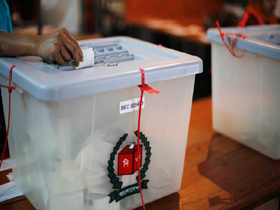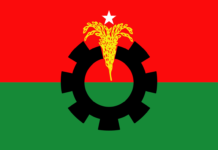The seven-murder accused had to prevent Khaleda’s long march in 1998 to earn trust
Shamim Osman has always bragged that he made Nur Hossain and Motiur Rahman Moti join the Awami League.
The ruling Awami League lawmaker from a Narayanganj constituency, in fact, first revealed to party chief Sheikh Hasina at a meeting that he had convinced Nur Hossain, then a powerful leader of the BNP in the district, to join the Awami League.
Nur Hossain is the main suspect of the sensational seven murders in the port city and is now in custody of Kolkata police. Moti, on the hand, has been in hiding since the murders.
According to SM Akram, former Awami League MP from a Narayanganj constituency, Shamim Osman and he were having an informal talks with party chief Sheikh Hasina on a day in the late 1990s during Hasina’s first five-year term when Shamim told her that he had “made Nur join the Awami League.”
“We were talking with the prime minister in an informal meeting when Shamim told her that he had made Nur Hossain join the Awami League leaving the BNP,” Akram told the Dhaka
Tribune.
“So far as I can recall, Shamim said: ‘Apa, I did a good work. I made one of BNP’s big fish join the Awami League.’ As the prime minister asked who he was, Shamim said: ‘Nur Hossain. He was a big activist of the BNP in Siddhirganj. I have brought him in,’” Akram said.
“The prime minister’s natural reply was: ‘You have done a good job,’” Akram said, talking to these correspondents at his residence in Narayanganj.
“I can only tell you this that Shamim Osman made Nur Hossain join the Awami League. I do not have any more information in this regard,” he said, adding that Shamim was trying to take credit for bringing Siddhirganj’s influential BNP leader and activist Nur Hossain to the Awami League.
Several months before the seven murders Nur was made the vice-president of Siddhirganj Thana Awami League.
After Nur was exposed as an underworld don or a godfather of Narayanganj following the seven murders, Shamim’s followers in Narayanganj Awami League now hesitate to talk about Nur’s joining the party and they try to hide Shamim’s role in this.
Nur Hossain has long been known as Shamim Osman’s man and the Narayanganj lawmaker even defended Nur after his name had come up as the main accused of the seven murders.
Nur, who began his career as a helper of a truck driver in Siddhirganj, was involved with former military dictator HM Ershad’s Jatiya Party in the 1980s. After the fall of Ershad he joined the BNP when Khaleda Zia came to power in 1991.
By that time Nur established his influence on transport workers and on extortion and other criminal activities in Siddhirganj as he had had a long career in the transport sector.
In 1992, Nur contested in the Siddhirganj union parishad chairman election and won. He had since got a new identity among Narayanganj residents. He had enjoyed ruling BNP administration’s support to win the election, said Chandan Seal, a Narayanganj district Awami League leader.
Through the victory in the election Nur made a major progress in politics. After the first tenure he contested for the same post in 1997 again with support from the BNP. Nazrul Islam, the Narayanganj City Corporation councillor who was among the seven murdered, also contested the poll and he had support from the Awami League.
Nazrul was announced winner but Nur challenged the result, alleging rigging by Nazrul’s men at a few new centres. He went to the court and won the legal battle. After re-polling at those centres Nur managed to ensure his victory in the election and became more influential in the area.
Chandan, a close associate of Shamim Osman, said Nur had tried to join the Awami League since the party came to power in 1996 but had not succeeded as some committed Awami League leaders had opposed it. But Nur kept trying.
To impress and earn the trust and confidence of Narayanganj Awami League leaders, Nur even helped barricade the Dhaka-Chittagong Highway in Narayanganj to foil the then opposition leader and BNP Chairperson Khaleda Zia’s long march programme from Dhaka to Chittagong, said Chandan.
Blocking Khaleda’s motorcade on June 9, 1998 to foil the BNP long march put Shamim Osman in the centre of criticism and he was branded as a godfather by some quarters.
Chandan said they had come to know from some Siddhirganj Awami League leaders that Nur Hossain had played a role to create the traffic jam to help Narayanganj Awami League’s unannounced blockade programme to prevent Khaleda’s motorcade.
From Siddhirganj party leaders, Chandan came to know that Nur had plotted to help the Awami League. Nur had sought some buses free of cost to make the BNP’s long march successful. But when owners denied, Nur’s men beat up some transport owners and workers.
In protest of the attack, in the early morning of the June 9, some transport owners kept their buses on the road in Simrail area of Siddhirganj, which was controlled by Nur, to block the road.
Nur had made the mission of helping the Awami League foil Khaleda’s long march through this stage-managed transport protest, said Chandan. “He did this to earn the confidence and trust of Awami League leaders so he could join our party.”
Soon Nur finally joined the Awami League.
Chandan said: “The BNP was not much strong in Narayanganj district at that time except in Siddhirganj area because of Nur Hossain.”
The Kanchpur Road and its bridge area is very important as people from some 20 districts need to use this spot of the Dhaka-Chittagong Highway to enter the capital. The strategic area was under control of Nur Hossain when he was in the BNP.
So, some influential Siddhirganj Awami League leaders thought if they could bring Nur in the party, the area and the whole Siddhirganj would come under their control, which would ultimately ensure the party’s supremacy in whole Narayanganj district, said Chandan.
The idea was convincing; these leaders talked with top influential Awami League leaders in Narayanganj, including the then lawmaker Shamim Osman. When everyone gave the nod Nur joined the party in 2001, said Chandan.
He said it was not like that Shamim made Nur join the Awami League but definitely leaders in Siddhirganj discussed the matter with top district leaders, including Shamim as he was the lawmaker and general secretary of the district unit.
Mojibur Rahman, the Siddhirganj Awami League president for more than a decade, could not be contacted for comments despite repeated attempts and even visit to his residence. General Secretary Yasin Mia, another accused of the seven murders, has also been absconding.
Acting general secretary Kalipada Mallik said Shamim Osman had not brought Nur in the Awami League. He, however, could not clear how and who made Nur’s joining the Awami League possible.
Kalipada admitted that Nur’s close associate Motiur Rahman Moti, president of Siddhirganj Jubo League, had been brought to the Awami League by Shamim Osman from Ershad’s Jatiya Party in the 1990s. Moti is also in hiding as some locals believe he was involved with the seven murder and demand his trial and execution.
Kalipada said Moti was a follower of Shamim Osman. He used Shamim’s picture in his posters, banners and graffiti. But Nur did not do so; in the January 5 national election, he rather sought nomination as the Awami League candidate from Shamim’s constituency.
Many locals, including some Awami League men, think that Nur was making progress in his political career in Narayanganj with an aim to ensure his supremacy, instead of Shamim’s, in the district.
Source: Dhaka Tribune










